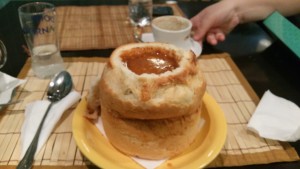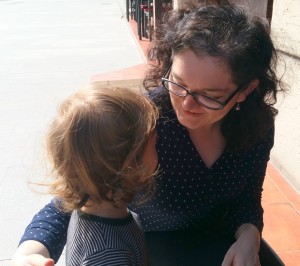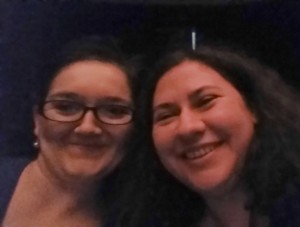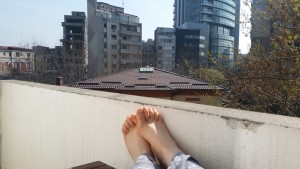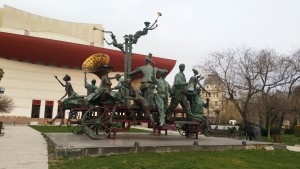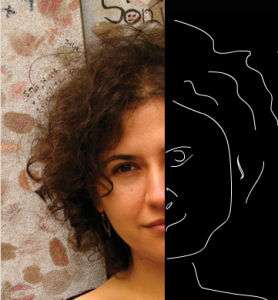
* scroll down to read this interview in Romanian
How does it feel to have I’m Not Jesus Christ debut in London?
I am extremely thrilled and touched that the play is making its debut nearly 10 years after I wrote it in the very place I worked a lot on its development. The play was written and developed during my time with the International Residency at the Royal Court, and I am very grateful to them for all their support, and in fact for the entire experience I had there. Once I returned home, I became busy with all sorts of other projects, and somehow I didn’t feel the need to personally promote this text. I didn’t feel there was a right time for it. But when Melissa wrote to me to say she wanted to direct it, I understood that the play wanted to be born into a production in the very place it was conceived J. So I am excited about it – it is an important premiere for me –, and also because it is a reflection of a time full of different meanings in my life, especially as its debut coincides with my reactivation as a playwright after two years of creative blockage and another two of maternity J.
Tell me a little bit about the play, what can we expect?
A story filled with black humour, innonce and violence about the love and sacrifice a boy has for his mother.
What was the inspiration behind the play?
A sadly true story: a poor and troubled mother who belives her son is Jesus Christ. I was moved by the way her child, harrassed by the mass media, was trying to protect his mother. Fortunately, the real story has a happy end.
I was attracted to the true event that inspired the play because, although extreme and unusual, it exemplifies a danger, which can affect us all. I understand that now particularly well, as a new mother: the danger to cast our children in the role of redeemers of our own anguish or sins.
So is this something you like tackling in your writing, taking inspiration from real life stories, and if so what are the challenges?
One of my most recent plays, Slaves, is also inspired by a true case, of modern slavery. My starting point was the real story, which I then wove ino wider themes and those that interest me, for example the artist torn between needing to react honestly to the world around him, and his selfish need for success… I’ve also written about homelessness and depression, and the journey has been the same: I document in equal measure the material (cases, stories) as well as the way I interpret it (through my fears, and anguish awoken by fears). In my plays, I feel like a journalist who cannot intervene, so I sometimes explore this inability of mine to truly help those I write about.
Have you always had a passion for theatre?
My dad told me I was conceived in the bed of a theatre play’s set. Recently, I discovered some plays I wrote as a child, which I’d forgotten about. Then, after highschool, I tried to become a director, but I gave up, I was scared of actors J. Only now, about 10 years later, all these threads have come together and it’s very clear to me today that I’m a writer. I feel like I’ve found my professional scope, and the fact that I’m not scared of actors anymore is a good sign too.
What has been the best advice you’ve been given?
As a human being: to not dish out advice. As a writer: to let the audience breathe. I’m still working on both.
And finally what do you hope people will take away from your work?
Love and unease.
I’m Not Jesus Christ runs at Theatre N16 in Balham 9 – 26 May.
*
Cum te simti despre faptul ca debutezi piesa Nu sunt Isus Hristos la Londra?
Sunt extrem de incantata si emotionata ca piesa apare, la aproape 10 ani dupa ce am scris-o, chiar in locul in care am lucrat foarte mult la ea. Piesa a fost scrisa si dezvoltata in cadrul Royal Court International Residency, si le sunt foarte recunoascatoare celor de acolo pentru tot suportul lor, de fapt pentru intreaga experienta. Ajunsa in tara, m-am luat cu alte proiecte si, cumva, n-am simtit nevoia sa promovez personal aceasta piesa. N-am simtit ca i-a venit timpul. Iar cand Melissa mi-a scris ca vrea s-o regizeze, am inteles ca piesa vroia sa se nasca ca spectacol in locul in care a fost conceputa :). Asa ca sunt emotionata si ca de o premiera importanta, dar si ca de o intamplare cu mai multe sensuri din viata mea, mai ales ca aceasta premiera coincide cu reactivarea mea ca dramaturg dupa doi ani de blocaj si inca doi de maternitate :).
Spune-ne scurt despre ce e vorba in piesa.
O poveste plina de umor negru, candoare si violenta despre dragostea si sacrificiul unui baiat pentru mama lui.
Ce te-a inspirat sa o scrii?
Din pacate, o poveste adevarata: o mama saraca si tulburata ce crede ca fiul ei e Isus Hristos. M-a emotionat felul in care copilul, hartuit de mass-media, incerca sa-si protejeze mama. Din fericire, povestea adevarata e cu happy-end.
Intamplarea folosita in piesa m-a atras pentru ca, desi extrema si neobisnuita, vorbeste despre un pericol care ne paste pe toti. Inteleg asta mai ales acum, de cand sunt mama: pericolul de a ne investi copiii cu rolul de mantuitori ai propriilor noastre chinuri sau pacate.
Folosesti des cazuri reale ca punct de plecare in opera ta, si care e procesul, si respectiv obstacolele in demersul lui?
Una din cele mai recente piese ale mele, Sclavi, porneste tot de la un caz real, de data aceasta de sclavie moderna. Am plecat de la povestea reala si am amestecat-o cu teme mai largi si de interes pentru mine, cum ar fi artistul scindat intre nevoia de a reactiona onest la lumea din jur, si nevoia egoista de succes… Am scris si despre homelesi si depresie, si traseul a fost acelasi: documentez in egala masura obiectiv (cazuri, povesti) cat si felul in care pica acea tema in mine (frici, dureri pe care mi le trezeste tema). In piesele mele, ma simt ca un jurnalist care nu poate interveni, asa ca uneori scriu si despre aceasta neputinta – a mea – de a-i ajuta cu adevarat pe cei despre care scriu.
Ai avut intotdeauna o pasiune pentru teatru?
Stiu de la tata ca am fost conceputa intr-un pat de decor. Recent, am descoperit niste piese scrise in copilarie, de care uitasem. Apoi, dupa liceu, am incercat sa devin regizor, dar am renuntat, mi-era frica de actori :). Abia acum 10 ani toate firele acestea s-au adunat in ceea ce-mi apare azi foarte limpede ca fiind destinul meu de dramaturg. Simt ca mi-am gasit drumul, si cel mai bun semn e ca nu ma mai tem de actori.
Care a fost cel mai bun sfat pe care l-ai primit vreodata?
Ca om: sa nu dau sfaturi. Ca scriitor: sa las publicul sa mai si respire. Inca lucrez la ambele.
Si in final, ce speri sa ia publicul din operele tale?
Dragoste si neliniste.
www.mariamanolescu.ro
